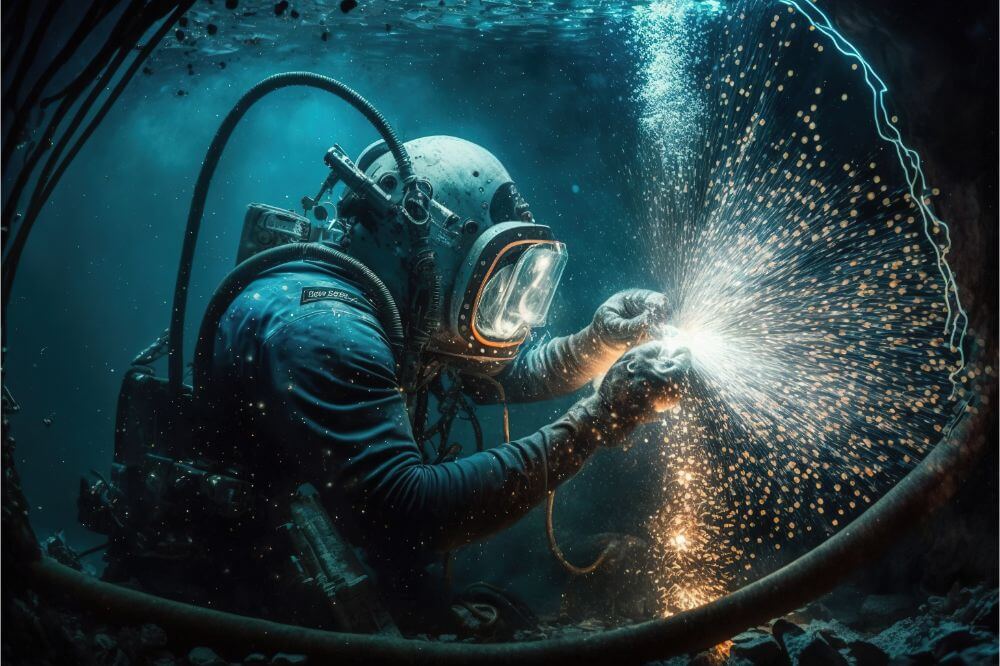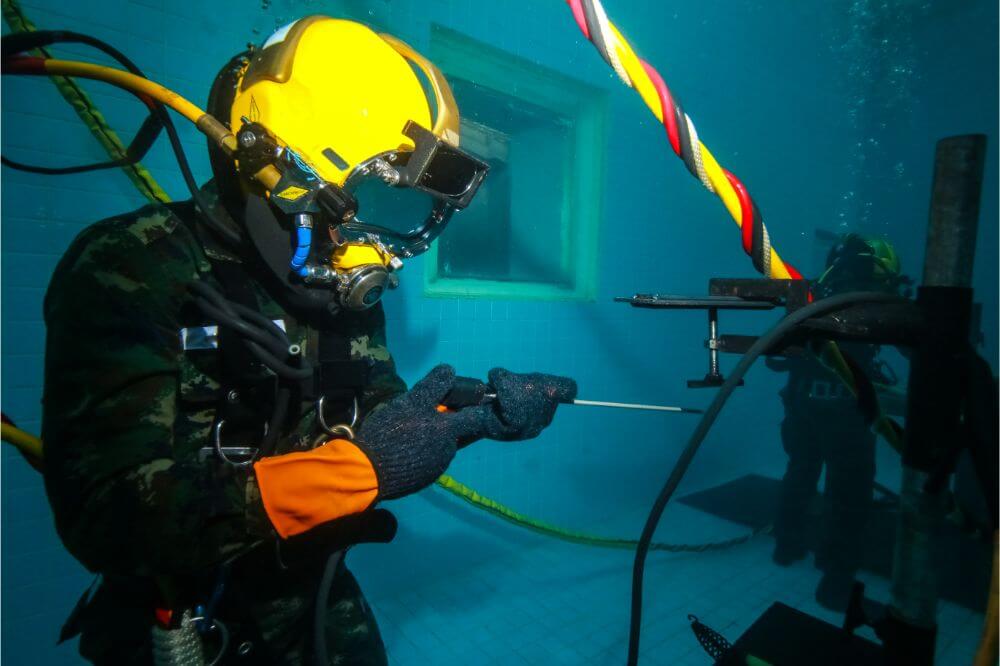Underwater welding is an exciting and essential trade in the maritime industry, combining professional diving and welder skills. This article will explore the pros and cons of underwater welding, providing valuable insight for those considering a career in underwater welding.
What is Underwater Welding?
Underwater welding is a specialized skill that combines welding techniques with diving expertise. These professionals work in aquatic environments to repair, maintain, and construct structures like pipelines, offshore drilling rigs, and marine vessels.
It involves using specifically-engineered equipment, such as watertight welding torches and dry chambers, to perform welding tasks while navigating challenging underwater conditions.
In underwater welding, the skill and precision of a welder are crucial as the water presents unique challenges for both the welding and diving aspects of the job.
Why is Underwater Welding Important?
Underwater welding is crucial in various industries, particularly constructing, maintaining, and repairing marine structures such as offshore oil platforms, pipelines, and ships.
This type of welding is a vital part of the maritime industry, as it provides essential services to keep the global marine transportation system running smoothly.
It also plays a significant role in underwater exploration and scientific research, with welders working on maintaining aquatic habitats and research facilities.
With the world’s growing dependence on ocean resources and the expansion of deep-sea industries, the importance of underwater welding continues to rise.
Pros of Underwater Welding
Underwater welding offers numerous advantages, such as high demand and lucrative salaries. It’s a challenging job that provides self-satisfaction and continuous learning.
Moreover, it presents opportunities to travel globally and is critical in constructing and maintaining underwater structures, such as pipelines and ship hulls.
High Demand and Lucrative Salaries
With numerous commercial diving projects worldwide, underwater welders are in high demand. This demand offers job security and pays attractive salaries for those in the field.
Skilled underwater welders can earn a high income, especially for complex or challenging projects or if they gain additional certifications.
This lucrative compensation makes underwater welding an appealing career option and motivates those considering this challenging profession.
Technical Challenge and Satisfaction
Underwater welding can be a highly rewarding career for those who crave a challenge and enjoy problem-solving. Each project presents unique technical difficulties that the welder must overcome, requiring constant adaptability and quick thinking.
The satisfaction gained from completing intricate tasks in complex underwater environments is immense, making it an attractive option for those seeking an unconventional career path.
For people driven by the thrill of conquering obstacles and working in demanding conditions, underwater welding can provide the sense of accomplishment and job satisfaction they desire.
Opportunity to Travel
One exciting advantage of being an underwater welder is the opportunity to travel. Many underwater welding projects are carried out in various parts of the world, from oil platforms in the North Sea to shipyards in Asia. This profession allows skilled welders to explore new places, experience different cultures, and enjoy diverse work environments.
Working on international projects can also contribute to career growth and open doors for future opportunities.
So, for those with wanderlust and a passion for functioning underwater, this profession offers a unique and rewarding way to combine travel with an engaging career.
Critical Role in Construction and Maintenance
Underwater welders play a critical role in construction and maintenance activities. This represents another significant advantage of the profession in addition to the generally high wages and opportunities for travel. Their services are essential for completing vital underwater projects, such as bridge pilings, oil rigs, and ship repairs.
Moreover, they often assist in inspecting and maintaining critical infrastructure like dams and water treatment plants.
Being able to provide valuable contributions to major engineering projects while working under challenging conditions can give underwater welders a great sense of personal fulfillment.
They ensure the safety, stability, and longevity of many essential underwater structures, providing an invaluable service to society.
In addition, participation in construction and maintenance projects offers professional growth opportunities. It allows underwater welders to apply their skill set in diverse situations while cultivating their proficiency in different technical processes.
These experiences can help strengthen their expertise and boost their employability in a competitive field.
Ultimately, the critical role that underwater welding plays in construction and maintenance, coupled with its unique opportunities, contributes to the overall attractiveness of the profession.
Despite the challenges and risks, the upsides far outweigh the drawbacks for many, making underwater welding a fulfilling and rewarding career choice.

Cons of Underwater Welding
Despite the numerous advantages, underwater welding also has its share of drawbacks. These disadvantages can potentially sway your decision in choosing this career path.
In the following sections, we’ll explore the hazards and health risks, short career spans, unpredictable working conditions, and intensive training and certification requirements associated with this field.
Be sure to weigh these cons carefully against the pros before making your final decision.
Hazards and Health Risks
The hazardous nature of underwater welding comes with various health risks that can’t be overlooked. Decompression sickness, also known as the bends, is a common ailment in this field caused by rapid changes in pressure.
Other health risks include electric shock, hypothermia, and exposure to harmful marine life. Prolonged exposure to damp environments can lead to respiratory problems and skin conditions.
Despite the satisfaction and fulfillment of embarking on an underwater welding career, it’s essential to consider these risks and invest in proper safety gear and practices to ensure a healthy and successful career.
Short Career Span
One significant downside of underwater welding is the short career span.
Due to the physically demanding nature of the job and the high risk of injuries, many underwater welders decide to hang up their electrodes earlier than expected. This may lead to a constant search for new opportunities and career transitions, which can be challenging.
Aspiring underwater welders must consider their long-term career goals and weigh the risks and rewards before diving into this profession.
Unpredictable Working Conditions
Another con of underwater welding is the unpredictable working conditions. Welders are often subject to rough seas, extreme temperatures, poor visibility, and strong currents. These factors can make it difficult to focus on the job and maintain high-quality welds.
Additionally, unforeseen complications, such as equipment malfunctions or structural issues, require quick thinking and adaptability, can occur.
While some may thrive in this dynamic environment, it’s essential to consider whether you have the personality and skill set to handle such unpredictability in your day-to-day work.
Intensive Training and Certification Requirements
Before embarking on a career in underwater welding, it’s essential to consider the intensive training and
certification requirements.
Underwater welders must complete extensive coursework, including diving courses, welding certification, and other specialized training programs, such as underwater cutting or rigging courses.
This process can be time-consuming and expensive, making it crucial for potential candidates to weigh their passion for the field against the investment of resources necessary to meet these qualifications.
Certifications must be maintained and regularly updated, requiring ongoing commitment to professional development. Considering these factors when evaluating the pros and cons of underwater welding as a career choice is essential.
Career Alternatives & Related Fields
For those who find the hazards and challenges of underwater welding too daunting, alternative careers in related fields still offer the chance to work near or in the water.
For example, a remotely operated vehicle (ROV) operator controls submersible vehicles for tasks like deep-sea exploration, environmental monitoring, and subsea construction.
Similarly, marine engineers design, develop, and maintain various infrastructures and systems utilized in the maritime industry.
While these career paths may not offer the same adrenaline rush as underwater welding, they provide opportunities for skill development and advancement in the marine sector, allowing individuals to pursue their passion for the ocean in a safer, more controlled environment.
ROV Operator
In addition to traditional underwater welding, another career option to consider is becoming a Remotely Operated Vehicle (ROV) operator. ROV operators control underwater drones, often used in place of human divers to perform tasks such as welding, inspections, and repairs.
This role presents an opportunity to engage in the exciting field of underwater work while potentially experiencing fewer health risks and gaining valuable skills with evolving technology.
Marine Engineer
If underwater welding isn’t for you, marine engineering is another lucrative and fulfilling career option in the maritime industry. Marine engineers design, develop, and maintain the mechanical systems of ships and offshore structures.
They also play a critical role in updating and improving maritime technology.
This career offers a more stable work environment and typically has a longer professional lifespan than underwater welding while providing unique technical challenges and opportunities to advance maritime projects.
Conclusion
Underwater welding offers unique challenges, rewarding salaries, and travel opportunities. However, it also entails significant risks, a short career span, and unpredictable working conditions.
Weighing these pros and cons is essential before venturing into this demanding field, as success in underwater welding requires skills and certifications and the mental fortitude to face its inherent challenges.

